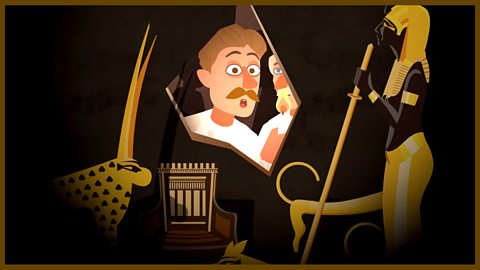The song and other video content explores Ancient Egyptian society and culture including jobs, trade, food and religious beliefs.
Amulets and hieroglyphs
Charms and messages and myths
Drifting sands and green palm trees
Ancient Egypt’s mysteries.Stories of the River Nile
Flowing north, mile after mile
Growing crops and farming land
Building temples in the sand.Pharaohs, farmers, rich and poor
Slaves or scribes, at peace or war
Healthy times, or plagues and strife
Real people living life.Baking, brewing, picking fruit
Playing tunes on harp and flute
Heads that turn and eyes that glance
Hands that write and feet that dance.Ritual costumes, masks that scare
Fancy make-up, jewels and hair
See the pictures, read the signs
And relive those early times.In their world mysterious
Weren’t they just a bit like us?
With games and toys and dolls and pets
And hieroglyphs and amulets.
Refer to the Teacher's Notes for more information about the song, including follow-up music activities based on it and suggestions for cross-curricular study.

What do we know about Ancient Egyptian society and culture?
This is a five deben weight. It's an artefact from Ancient Egypt. An artefact is an item from a particular time or place that tells us something about life in that time. Deben weights like this one tell us about the achievements of Ancient Egyptian society.
The first deben weight that we know about dates all the way back to eighteen hundred BC. Back in Ancient Egypt there was no such thing as money. If Ancient Egyptians wanted something they didn't have they had to trade something they did have to get it.
Debens were used to measure out produce in the same way that we use grams or kilograms today. Each deben weighed exactly the same so that meant it could be used to set a price and ensure a fair exchange.
The fact that Ancient Egyptians could exchange their produce or their skills in this way, meant that they were able to specialise in aparticular job or craft. It also meant the average diet was really quite varied and nutritious.
Ancient Egyptian society started because groups of people were attracted to the River Nile as a source of food and water. These people built villages along the river and learnt how to farm and use boats to travel. Eventually the northern areas where most people lived were united under one pharaoh who was called Narmer. This was the start of a state that lasted for almost three thousand years. By the time the final pharaoh, Cleopatra VII, was in charge the building of the pyramids was already ancient history.
Over the years there were many wars and revolutions, the shape of society changed quite a lot. Well, three thousand years is a long time. But, one thing stayed the same: the pharaoh was always the most powerful and important person in Egyptian society. In fact, pharaohs were considered so important that it was believed that they could turn into gods after death.
When one Pharaoh died it would usually be his son who became the next pharaoh. If the pharaoh had no son a daughter might be chosen. If there was no daughter then it was another member of the Royal Family.
After the pharaoh the next most important people in society were government officials, nobles and high priests. But most Ancient Egyptians were just ordinary people who did all sorts of different jobs.
A very important job to hold was that of a scribe. These were people, usually men, who could read and write the Ancient Egyptian style of writing called hieroglyphics.
Back then not everyone got the chance to go to school to learn to read and write. So you were pretty lucky if you did. It was mostly the children of the rich who got to go to school - usually boys - but some girls also learnt to read and write at home.
Poorer children were generally taught how to do their parents' jobs and most didn't get the chance to learn reading and writing.
Some Egyptian pharaohs were women - in fact, Ancient Egypt wasn't a bad place to be a woman at all, in nearly every way they were treated as equal to men. But even so there were still some senior jobs that were reserved for men.
Actually Ancient Egypt wasn't a bad place to live for most people. When times were good ordinary, average folk, even had time for hobbies and sports. For less sporty types, there were board games. Some of the pharaohs loved their board games, so much, they even had them placed in their tombs so that they could play them in the afterlife.
Ghost Pharaoh: Does anyone want to play with me?
Society and culture
This video gives pupils an understanding of the society and culture of Ancient Egypt and helps them to understand some of its achievements.
The video begins with an artefact from Ancient Egypt called a deben. A deben was a weight the Ancient Egyptians used to ensure fair and comparable trade of goods.
Moving through the video pupils will gain an overview of many of the jobs that Ancient Egyptians did, the importance of the pharaoh to Egyptian society, the significance of the River Nile to all aspects of life, the role of women in society and some of the ways the Ancient Egyptians liked to spend their leisure time.
Nanu: Hi I'm Nanu and this is my mother's farm. Well, I mean it actually belongs to Lord Wegaf or maybe even the Pharaoh! I'm not sure, but anyway ever since my father died five years ago, it's been my mother and us children who have done all the work round here.
I'm the eldest daughter in the family with five little ones to help mum look after. That's my older brother Ahkhom. He does most of the heavy farm-work since father died. But we all do our fair share.
Right now it's nearly the end of Akhet, the flooding season. The land is beginning to dry out and all that black silt and soil left behind by the Nile will be really good for growing crops. That means it's going to be Peret soon, the growing season. That's why everyone is busy getting ready.
Ok, Idu, I have what I need now, let me have a look! That should draw out the splinter. Now, just be careful with it today and I'll have a look at it later.
Idu: Ok!
Nanu: I love helping people when they are sick or hurt. It's my dream that some day I can become a Swnwt, a doctor. Of course, my mother says I'm dreaming! She says in Egypt farm girls don't get to be doctors, especially farm girls with trouble walking.
This is Imhotep - the patron god of doctors. I make an offering to him every day.
And I read everything I can get my hands on about healing and medicines. I can read quite well and even write a little.
The scribe from the temple of Sekhmet has been teaching my brother Ahkhom since our father died. He has no children of his own to pass the skill on to and my mother convinced him to teach Ahkhom, so he comes here many evenings. And me? Well, it's amazing what you can pick up, if you sit close enough. In fact, I'd say I'm definitely a better scribe than Ahkhom now and even the old scribe knows it.
Lady Wegaf? Did he eat those berries? Those berries are poisonous.
Lady Wegaf: Yes, but I don't know how many of them he's eaten!
Nanu: We need to act quickly. In a child so small those berries could be deadly. Don't worry, I know what to do. Here, get him to drink this. You have to trust me, there's no time to waste.
Lady Wegaf: It's okay my love, drink this, it will make you better. Goodbye Nanu and thank you!
Nanu: Lady Wagaf couldn't thank me enough for saving her child. I had heard she has a relative in the school of lady physicians.So I told her that my dream is to be a doctor. She says she will send a message right away to recommend me as an apprentice.Anything for the girl who saved the life of her son. Who says farm girls can't be doctors, or at least, doctors' apprentices.
Nanu - The Farm Girl
This video follows the story of Nanu, a fictitious 12-year-old farm girl from Ancient Egypt.
She lives with her mother and five brothers and sisters on a farm owned by Lord Wagaf. Since her father died, Nanu and her siblings work with their mother to run the farm - but Nanu dreams of becoming a doctor and makes offerings to the god of physicians every day.
We explore Nanu’s story and how important the River Nile was to successful farming in Ancient Egypt. We learn about the different seasons of Ahket and Peret and how farming changed during these times.
The video is particularly useful for exploring the life of a typical farming family in Ancient Egypt and also the differences between the lives of girls and boys.

Resources
Song: 'Amulets and hieroglyphs' - Instrumental
Amulets and hieroglyphs
Charms and messages and myths
Drifting sands and green palm trees
Ancient Egypt’s mysteries.Stories of the River Nile
Flowing north, mile after mile
Growing crops and farming land
Building temples in the sand.Pharaohs, farmers, rich and poor
Slaves or scribes, at peace or war
Healthy times, or plagues and strife
Real people living life.Baking, brewing, picking fruit
Playing tunes on harp and flute
Heads that turn and eyes that glance
Hands that write and feet that dance.Ritual costumes, masks that scare
Fancy make-up, jewels and hair
See the pictures, read the signs
And relive those early times.In their world mysterious
Weren’t they just a bit like us?
With games and toys and dolls and pets
And hieroglyphs and amulets.
Teacher's Notes. document
Information and guidance on the songs and other content in KS2 Music: Ancient Egypt
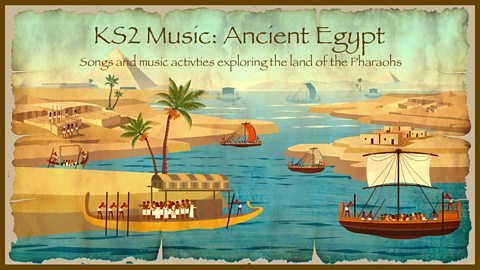
Amulets and hieroglyphs - Lyrics. document
Print / download the lyric sheet (pdf)
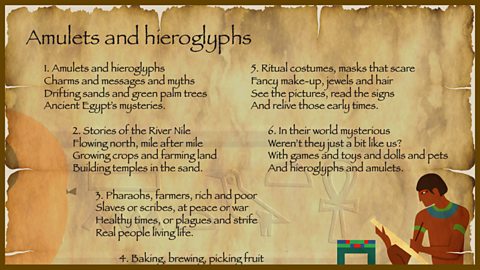
Amulets and hieroglyphs - Music. document
Print / download the music sheet (pdf)
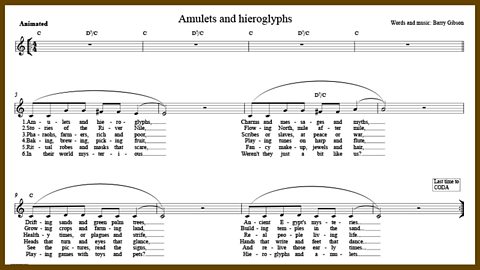
Download audio
Download the backing track of the song (mp3)

Roles and occupations. image
Click to display the image full-size
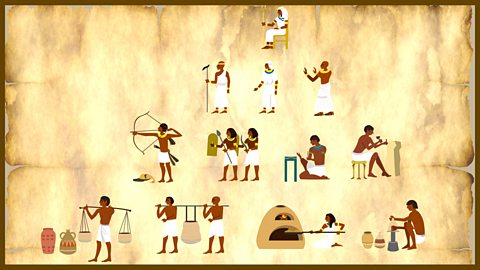

More from KS2 Music: Ancient Egypt
Living, living River Nile
Exploring the critical importance of the River Nile to Ancient Egyptian civilisation - including trade, food and irrigation.
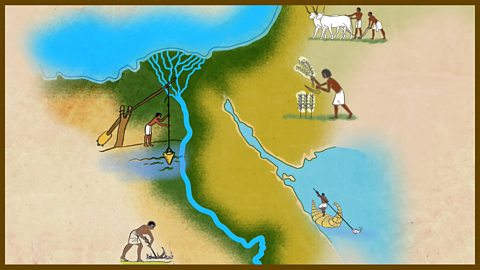
Build that pyramid
A lively, energetic work song covering the building and function of the pyramids and their changing styles.
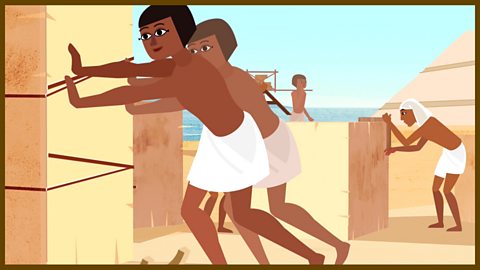
Out of the gloom, Tutankhamun
Exploring the life and death of Tutankhamun and the discovery of his tomb in 1922 by Howard Carter.
